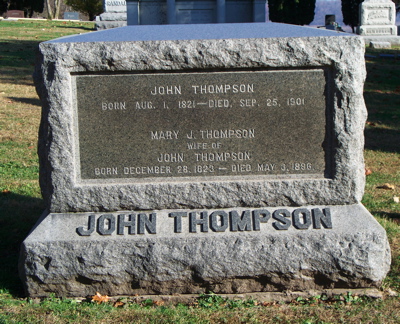Encyclopedia Dubuque
"Encyclopedia Dubuque is the online authority for all things Dubuque, written by the people who know the city best.”
Marshall Cohen—researcher and producer, CNN
Affiliated with the Local History Network of the State Historical Society of Iowa, and the Iowa Museum Association.
THOMPSON, John
THOMPSON, John. (County Fermanagh, Northern Ireland, Aug. 1, 1821-Dubuque, IA, Sept. 25, 1901). MAYOR. Thompson's family came to Erie County, Pennsylvania in 1840. He moved to and lived in Chautauqua, New York and worked there as a harness-maker before he traveled to Iowa and went into business with L. D. Randall. Their partnership grew to become the largest wholesale leather and saddlery hardware business west of the MISSISSIPPI RIVER.
Thompson served Dubuque as its mayor for three terms, being unanimously re-elected by both parties without opposition for his second term. As mayor of Dubuque during the CIVIL WAR, Thompson took an active role in raising volunteers for the Union Army and enjoyed the admiration of General U.S. Grant who often dined at Thompson's elegant Locust Street mansion. "Has the county a right to tax the city to secure a fund to be used in building bridges within the city limits?" was the main question early in 1864. A committee of the city council in September, 1864, after due examination and deliberation, reported that in its opinion it had no authority to open a harbor on Third street as desired by officers of a packet company. The council thereupon passed a resolution instructing the harbor committee "to open a channel at the intersection of Third street with the slough leading into the inner harbor and to build a bridge across said channel with a draw of sufficient width to allow boats to pass up into the inner slough, thus giving steamboats access to the inner harbor and levee, affording a safe and convenient place for laying up steamboats and barges in winter and also furnishing a convenient place for building barges and doing all kinds of steamboat repairs; that the committee be also instructed to take up the bridge which now crosses the inner slough at Third street and to fill up the channel under said bridge." In 1865, for the first time, a regularly paid and disciplined police force was maintained.
At this time the council refused to appropriate $500 for the State Fair to be held here in the fall of 1866. Within a few days the citizens raised $3,421 to secure the fair for two years, prepare the grounds, etc. The city, however, failed to get the fair in 1866.
Water works for the city were proposed in July, 1866. It was declared that the old method of hauling water from the river must be abandoned and a new modern system installed. From the bluffs north of the city a large supply of pure water could be secured, it was announced.
The council committee reported against granting the use of the streets to a railway company until such step was clearly authorized by the legislature. The citizens demanded a large public park at this date.
In August, 1866, the council authorized the Water Company to lay pipes in the city. After much controversy it was finally determined to submit to popular vote the question of permitting the horse railway to occupy the streets. The result was as follows: For the railway, 2,185; against the railway, 127.
Thompson later sold his home to William A. RYAN who had the structure, known today as the RYAN HOUSE, moved thirteen feet south.
---
Source:
Linda McNair Cohen, relative
Oldt, Franklin T. History of Dubuque County, Western Historical Association (Chicago) 1880;


